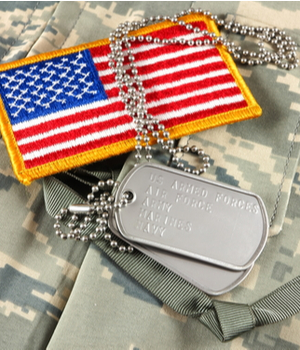35 Military Veterans Recovery and Mental Health Resources
When you combine emotional stressors with the unique pressures military Veterans face, coping can become extremely difficult. Substance abuse is a concern among veterans – particularly abuse of alcohol and opioids. Thankfully, supportive resources for addiction and mental health are readily available to help members of this community thrive in recovery.
Veteran Addiction and Mental Health Statistics

Veterans face unique challenges, stressful situations, and extreme circumstances. It’s true during their years of service, and it’s true every year after. And these conditions expose Veterans to an increased risk of substance use disorder and mental health issues.
- Nearly 33% of Veterans seeking treatment for a substance use disorder also have post-traumatic stress disorder (PTSD).
- More than 10% of U.S. Veterans have been diagnosed with a substance use disorder (SUD).
- A person with PTSD is two to four times more likely to develop a substance use disorder.
These statistics demonstrate the need for support services for veterans. This resource guide offers crucial information to help veterans and their loved ones identify mental health and substance abuse concerns and discover where to turn to get the help they need.
Military Veteran Self-Screening Tools for Addiction
The VA provides a number of simple self-assessments that can reveal a Veteran’s level of risk for mental health or substance abuse issues, based on current lifestyle habits. Below you’ll find two of those self-assessment screenings – one for substance abuse, and one alcohol abuse.
Veteran Substance Abuse Screening
(Click here for an interactive version of this screening.)
In your life, have you ever used any of the following substances?
- Tobacco products
- Alcoholic beverages
- Cannabis
- Cocaine
- Stimulants
- Inhalants
- Sedatives/Hypnotics
- Hallucinogens
- Opioids
- Other drugs
If you answered “Yes” to any of these items, answer # 2 for each substance ever used.
In the past three months, how often have you used the substances mentioned?
- Never
- Once or twice
- Monthly
- Weekly
- Daily or Almost Daily
If you answered “Never” to all items in #2, skip to #6. If you used any substances in #2 in the previous three months, continue on to 3, 4 & 5, answering for each substance used.
During the past three months, how often have you had a strong desire to use (first drug, second drug, etc.)?
- Never
- Once or Twice
- Monthly
- Weekly
- Daily or Almost Daily
During the past three months, how often has your use of (first drug, second drug, etc.) led to health, social, legal, or financial problems?
- Never
- Once or Twice
- Monthly
- Daily or Almost Daily
During the past three months, how often have you failed to do what was normally expected of you because of your use of (first drug, second drug, etc.)?
- Never
- Once or Twice
- Monthly
- Weekly
- Daily or Almost Daily
Answer #6 & #7 for all substances ever used (all “Yes” answers in #1).
Has anyone else ever expressed concern about your use of (first drug, second drug, etc.)?
- No, never
- Yes, in the past three months
- Yes, but not in the past three months
Have you ever tried and failed to control, cut down, or stop using (first drug, second drug, etc.)?
- No, never
- Yes, in the past three months
- Yes, but not in the past three months
Score Your Answers
- For questions 2-5, each “Never” answer has a value of 0. Each “Once or Twice” answer has a value of 3. Each “Monthly” answer has a value of 4. Each “Weekly” answer has a value of 5. Each “Daily or Almost Daily” has a value of 6.
- For questions 6 & 7, each “No, never” answer has a value of 0. Each “Yes, in the past three months” answer has a value of 6. Each “Yes, but not in the past three months” answer has a value of 3.
- Find your total to determine your screening result for each substance.
Results
- For alcohol: A score of 0-10 = Low Risk. A score of 11-26 = Moderate Risk. A score of 27 or more = High Risk
- For all other substances: A score of 0-3 = Low Risk. A score of 4-26 = Moderate Risk. A score of 27 or more = High Risk.
Defining the Risk Factors
- Low Risk: Based on your current patterns, you are at low risk of health or other problems related to your substance use.
- Moderate Risk: Your current pattern of substance use puts you at risk of health problems and other issues.
- High Risk: Based on your current patterns, you are at high risk of experiencing severe problems and are likely dependent on one or more substances.
NOTE: These screenings are not designed to provide a comprehensive assessment or diagnosis. Only qualified professionals can provide a complete assessment, diagnosis, and prescription for appropriate treatment. If you have any concerns about your mental health or substance use patterns, do not hesitate to reach out to a professional for support and guidance.
Stages of Alcoholism for Military Veterans
Alcoholism doesn’t happen overnight. Veterans reach this stage of addiction through repeated patterns of behavior over time. For Veterans concerned about abuse of alcohol, watch for the following progression toward alcoholism.
 Stage 1: Pre-Alcoholic Drinking: During this stage, a person is not fully addicted to alcohol. The stage usually starts with social drinking. It then transitions to drinking as a coping mechanism. For Veterans, alcohol is often a way to self-medicate PTSD symptoms. This type of drinking is considered alcohol abuse. As the person abuses alcohol, they require more and more of it to feel drunk, and it becomes a priority for them. This is called alcohol dependence.
Stage 1: Pre-Alcoholic Drinking: During this stage, a person is not fully addicted to alcohol. The stage usually starts with social drinking. It then transitions to drinking as a coping mechanism. For Veterans, alcohol is often a way to self-medicate PTSD symptoms. This type of drinking is considered alcohol abuse. As the person abuses alcohol, they require more and more of it to feel drunk, and it becomes a priority for them. This is called alcohol dependence.- Stage 2: Early Alcoholism: Entering stage two involves a shift in attitude and behaviors. The person realizes they are experiencing problems due to their alcohol abuse, but they find it hard to stop drinking. They may engage in dangerous habits, such as binge drinking. Their overall emotional and mental wellness declines.
- Stage 3: Middle Alcoholism: At this stage, friends and family notice that the person has a drinking problem. The person drinks more often, even skipping other events to drink. They drink at inappropriate times, such as while driving. Mental health issues worsen. Physical symptoms of alcohol addiction appear. The person may gain or lose weight, experience a loss of energy, and feel bloated. If they stop drinking, they experience physical withdrawal symptoms.
- Stage 4: Late-Stage Alcoholism: This stage is also called “end-stage alcoholism.” When a person reaches this point, they spend more time drunk than sober. They probably won’t be able to hold down a job. They may also develop an addiction-related illness. At this stage, a person most likely needs a rehabilitation program to treat the effects alcohol is having on their mental and physical health.
PTSD Treatment for Veterans
PTSD affects many Veterans, and it is a risk factor for mental health issues and substance abuse. A shocking 33 percent of Veterans diagnosed with substance use disorder also have PTSD, which is referred to as a co-occurring mental health disorder. Addiction and mental health conditions interact in a complex way, so specialized addiction treatment is pivotal if you are seeking help for a dual diagnosis.
PTSD does not have to lead to mental decline or addiction. Treatment is available. And with the right treatment, Veterans with PTSD can manage their symptoms and get their lives back.
Following are some of the most common and trusted methods for treating PTSD:
- Prolonged Exposure (PE): This method teaches Veterans how to face their negative feelings to gain control. Veterans talk about their trauma and do things they have been avoiding since their trauma.
- Cognitive Processing Therapy (CPT): This involves talking and writing about negative thoughts. It teaches Veterans to reframe their negative thoughts.
- Eye Movement Desensitization and Reprocessing (EMDR): This is accomplished by recalling trauma while focusing on a back-and-forth movement or sound. It helps Veterans process their trauma.
- Antidepressants: Some of the same medications that are used for treating depression are helpful for treating PTSD symptoms. These medications are called selective serotonin reuptake inhibitors (SSRIs) and serotonin-norepinephrine reuptake inhibitors (SNRIs). The medications affect the level of chemicals in the brain that affect the way a person feels. The most common antidepressants used for treating PTSD are sertraline (Zoloft), paroxetine (Paxil), fluoxetine (Prozac), and venlafaxine (Effexor).
Veteran Benefits for Recovery and Mental Health
If cost is a barrier, it may be difficult to consider various treatment options available. Fortunately, Veterans can access many different services through VA medical centers and community-based clinics for free or at reduced cost.
Available services include:
- Inpatient care
- Outpatient care
- Homeless programs
- Substance use treatment
- Specialized PTSD services
- Suicide programs
- Violence prevention
- Psychotherapy programs
- Mental health activities
Veterans Disability Benefits
Veterans may be eligible for VA disability benefits for conditions related to alcoholism. For example, if a veteran suffers from PTSD, then starts drinking to cope with the symptoms, then develops liver disease, the veteran may be eligible for compensation for the liver disease.
Following are additional resources Veterans and their families can tap into to receive multiple benefits and much-needed support.
Military Veterans Mental Health Resources
- American Foundation for Suicide Prevention: This suicide prevention site offers information and resources for veterans and their families. The site includes multiple resources for those who may be at risk for suicide.
- Depression Screening: This allows Veterans to answer questions focused on symptoms of depression, to see if they might be experiencing depression.
- Give an Hour: This site connects Veterans with local mental health clinics for a free counseling session. Search the directory to find a health provider to help with substance abuse, PTSD, anxiety, depression, and other mental health concerns.
- Operation Reach Out: Free suicide prevention app provided by Military Community Awareness, designed to prevent suicide among military personnel and veterans. Developed by a team of suicide prevention experts and designed to encourage people to reach out for help and stay connected with others.
- PTSD Screening: This allows Veterans to answer questions regarding common problems that Veterans have after stressful experiences, to reveal if they might have PTSD.
Military Veterans Treatment Directories
- Community Care Network: This VA program offers Veterans a direct link to community providers to receive treatment and care.
- Community Provider Toolkit: This site provides information and tools related to Veterans’ mental health. The resources are designed to help community providers who care for Veterans.
- National Resource Directory: This database offers validated resources that support recovery and rehabilitation for Veterans and their family members and caregivers.
- Treatment Program Locator: This site offers a map to find VA substance abuse treatment centers across the country. The site also includes links to additional resources.
- TriCare: This is a health care program for uniformed service members, retirees, and their families. Their mission is to enhance the Department of Defense by providing health support for military personnel.
- Veterans Alcohol and Drug Dependence Rehabilitation Program: This program offers medical, social, vocational, and rehabilitation services to alcohol dependent Veterans. Treatment options include rehab, detox, and psychiatric care.
Military Veterans PTSD Resources
- Home Base Program-Clinical Intensive Care Program: This two-week intensive program offers treatment for Veterans and their families who are suffering from PTSD, traumatic brain injury, sexual assault, depression, and co-occurring substance use disorders.
- Lone Survivor Foundation: This foundation offers in-person and virtual programs that provide healing tools for Veterans and their family members.
- Military One Source: This site connects Veterans to information and support related to PTSD or traumatic brain injury.
- Operation Mend-Intensive Treatment Program: This program offers comprehensive psychological healthcare and social support for Veterans and families impacted by injuries and PTSD.
- Psychological Health Centers of Excellence: This organization’s mission is to improve the lives of Veterans and their families by advancing research in military psychological health care.
- PTSD Foundation of America: This nonprofit is dedicated to mentoring Veterans and their families who struggle with post-traumatic stress. Offers a combat trauma helpline: 877-717-7873
- Understanding PTSD and PTSD Treatment: This free booklet offers information about PTSD and treatment options that are available.
- USA Cares – Combat Injured Program: This program offers financial support for Veterans who undergo treatment for PTDS.
- VA National Center for PTSD: This is the world’s leading educational and research center of excellence on PTSD and traumatic stress. It offers information and treatment options for Veterans who have experienced PTSD.
- VA Vet Center Program Vet Centers: These centers offer multiple services to Veterans and their families. 300 locations are available.
Military Veterans Organizations and Foundations
- Hope for the Warriors Care Management Services: This organization provides support programs for service members, veterans, and military families. Resources offered focus on health and wellness, peer engagement, and connecting to other community support networks.
- Iraq and Afghanistan Veterans of America (IAVA): This organization provides information and resources for Veterans and their families regarding mental health.
- Real Warriors: An effort put forth by the Military Health System, promoting support for the psychological health of military personnel. Encourages the military community to reach out for help with depression, anxiety, and PTSD. Links veterans and their families with care and provides free resources.
- Substance Abuse and Mental Health Services Administration (SAMHSA): This agency is part of the U.S. Department of Health and Human Services. Its mission is to reduce the impact of substance abuse and mental illness in the U.S. The site offers links to multiple resources available to Veterans and their families.
- Wounded Warrior Project: This nonprofit helps Veterans connect with support groups and programs. Their focus is on Veterans who incurred injury or illness while serving on or after September 11, 2001.
Military Veterans Media Resources
- Make the Connection: Watch videos, read stories, and listen to podcasts of Veterans and their loved sharing their experiences, struggles, and recovery. Search 800+ videos by service era, branch, gender, and combat experience to find relatable stories.
- Suicide Prevention and Mental Health Resources Provide Help: You Are Not Alone: This article discusses mental health issues which often co-occur with addiction and offers resources for support.
Resources for Veteran Families
- Operation Homefront: This service offers support for Veterans, spouses, and children. Resources include those related to alcohol addiction as well as other issues, including financial assistance.
- Supporting Military Families: This division of the Department of Health and Human Services offers resources and programs specifically designed to support military families. These include many resources for substance abuse and related issues.
- VA Caregiver Support: This VA program provides assistance to family members who care for injured veterans. It offers a support line and information for caregivers.
- VA Mental Health Services for Veterans and Families: This handbook shares what mental health services are available through local and regional VA health care facilities. Offers information for Veterans, Veteran family members, and members of Veterans service organizations.
Military Veterans Crisis Lines
- Lifeline for Vets: Call 888-777-4443. Provided by the National Veterans Foundation. Offers crisis management and support for Veterans in need.
- Military Helpline: Call 888-457-4838 or text MIL1 to 839863. Available 24/7. Provides free and confidential support to Veterans who are facing difficulties, including suicidal thoughts. The lifeline is staffed by Veterans and others who have experience in the military life.
- Veterans Crisis Line: 800-273-8255 – Call for confidential crisis support. For Veterans and their loved ones. Available 24/7.
References
- Alcohol use screening – My HealtheVet. (n.d.-a). My HealtheVet. Retrieved July 12, 2022, from https://www.myhealth.va.gov/mhv-portal-web/alcohol-use-screening#noJavascript
- McCauley, J. L., Killeen, T., Gros, D. F., Brady, K. T., & Back, S. E. (2012). Posttraumatic stress disorder and co-occurring substance use disorders: Advances in assessment and treatment. Clinical Psychology : A Publication of the Division of Clinical Psychology of the American Psychological Association, 19(3). https://doi.org/10.1111/cpsp.12006
- Mile, H. (2021, March 24). Stages of alcoholism for veterans: How to break free. Heroes' Mile Veterans Recovery Center. https://www.heroesmile.com/stages-of-alcoholism-for-veterans-how-to-break-free/
- National Institute on Drug Abuse. (2019, October 23). Substance use and military life drugfacts. National Institute on Drug Abuse. https://nida.nih.gov/publications/drugfacts/substance-use-military-life
- Substance abuse screening – My HealtheVet. (n.d.). My HealtheVet. Retrieved July 12, 2022, from https://www.myhealth.va.gov/mhv-portal-web/substance-abuse-screening#javascript
- VA.gov. (n.d.-a). PTSD: National Center for PTSD. Retrieved July 12, 2022, from https://www.ptsd.va.gov/understand/related/substance_abuse_vet.asp
- VA.gov. (n.d.-b). PTSD: National Center for PTSD. Retrieved July 12, 2022, from https://www.ptsd.va.gov/understand_tx/tx_basics.asp
- Woods, N. (2021, October 12). Is alcoholism a VA disability? Woods and Woods, LLC, Veterans Disability Lawyer. https://www.woodslawyers.com/alcoholism-va-disability/

